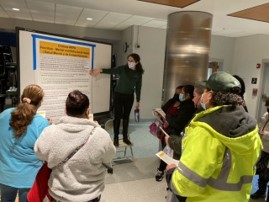
Do you have a story to tell about your community’s ARPA work? We want to hear from YOU about how you are advocating for equitable recovery through ARPA funds at the local or state level. Send us an email and share your story!
Massachusetts is on the precipice of transformational change. The American Rescue Plan Act (ARPA), the $1.9 trillion economic stimulus bill signed into law in March 2021, initiated a process to invest billions of dollars into communities across Massachusetts. This once-in-a-lifetime level of investment is not only an opportunity to advance equity, but an imperative: by Federal rules, ARPA investments are required to promote equitable outcomes. In Massachusetts, over $8 billion in ARPA funds will be allocated toward housing, health and human services, infrastructure, education, and economic development. How the funds will be distributed is up to the state and local governments. Now is the time for community members to inform decisions about local investments.
COVID-19 laid bare inequities across the Commonwealth and the country, and ARPA funds are designed to address them. To do this effectively, local government must engage with community groups and residents that have been disproportionately impacted by the pandemic to set priorities and make community-driven investments. HRiA, with support from the Barr Foundation, is collaborating with communities to support engagement strategies and lift up local examples to learn from and inspire creative, transformative approaches across Massachusetts.
Celebrating great work around the Commonwealth
“Those closest to the pain should be closest to the power, driving and informing our policymaking.” Congresswoman Ayanna Pressley, Massachusetts’s 7th congressional district.
Several cities are seizing the opportunity to center those most impacted by the pandemic. They are acting on the principle that ARPA investments CAN and MUST take into account an equitable recovery. Some examples include:
- Early in the ARPA process, the City of Chelsea pioneered a community engagement process whereby they set aside $15 million of the $40 million received for community-led allocation. Over the course of six months, a 20-member community-led committee engaged in a robust data gathering effort through community meetings, interviews, and focus groups with diverse cross-sections of the city. The group ultimately prioritized and developed funding strategies to allocate $15 million across six priority areas addressing critical issues such as housing, equitable access to digital services, and early childhood education.
- One of the City of Lynn’s first ARPA expenditures was hiring interpreters to increase city hall’s capacity to reach all its residents. Officials from Lynn conducted extensive grassroots outreach, including informational sessions and a community survey that engaged more than 1,700 residents. The city identified gaps in engagement and developed a plan to focus future outreach in historically excluded populations, including young people, renters, residents with disabilities, communities of color, and foreign-born residents. Beginning in May, all residents can propose project ideas on an accessible, simplified resident proposal form. The city plans to develop a process where residents can vote for their projects of interest.
- In the City of Worcester, the city government has closely collaborated with members of the Worcester Together logistics committee—a volunteer-run collaborative—to co-facilitate an equitable resident review process for ARPA spending. Five resident review committees have been established and will be reviewing project proposal submissions in domains such as mental health, the creative economy, and affordable housing. City officials have proven to be flexible and responsive to the funding concerns of community activists, increasing investments for committee review from $12 million to $29 million dollars. Worcester is committed to being transparent about the ARPA process and has invested in developing a dashboard to track real-time data that shows how and where ARPA funds are being spent.
- The City of Holyoke’s Board of Health and Office of Planning and Economic Development are collaborating to reach businesses—particularly those owned by groups who have been historically excluded from government decision-making – to proactively identify challenges and opportunities for ARPA investments. The city is focusing on strengthening cross-sector partnerships, including with the Greater Holyoke Chamber, community-based organizations, and HRiA to conduct targeted outreach with struggling businesses to better understand how ARPA resources can be leveraged. Information from a comprehensive survey and one-on-one interviews with business owners will be synthesized and made accessible in both English and Spanish, and findings will be used to make data-informed decisions for Holyoke’s next round of funding.
What’s next?
Engaging with residents cannot and should not be a one-time event. ARPA funding has the potential to shift the way local governments engage residents in budgeting decisions so that communities can be transformed. This happens when city government acknowledges the wisdom and perspective offered by deep community engagement activities and seeks partnership in decision-making, rather than mere input. It requires constant reflection on who is part of decision-making, and who is not, and moving towards inclusive decision-making and power-sharing. It means taking risks.
HRiA recognizes the cities of Chelsea, Lynn, Worcester, and Holyoke for implementing inclusive decision-making practices and modeling ways that local government can leverage ARPA funds to build community power and increase transparency in decision-making.
HRiA continues to partner with community groups, residents, and local governments to collaboratively advocate for and advance equitable recovery. Learn more about our approach and services—made available at no cost, thanks to support from the Barr Foundation. Follow us as we continue to partner and collaborate with cities across MA and highlight stories of how ARPA is transforming communities.

